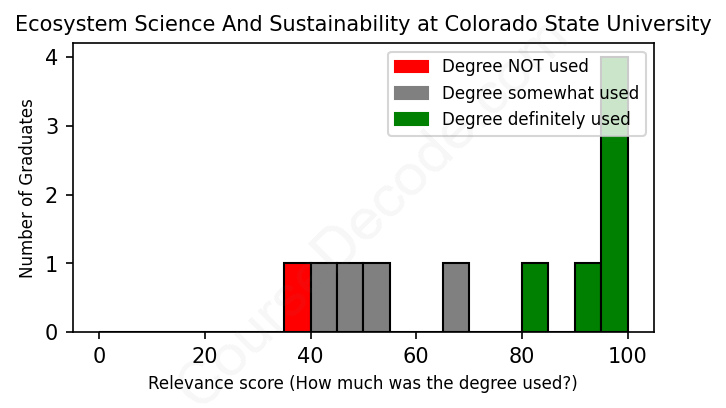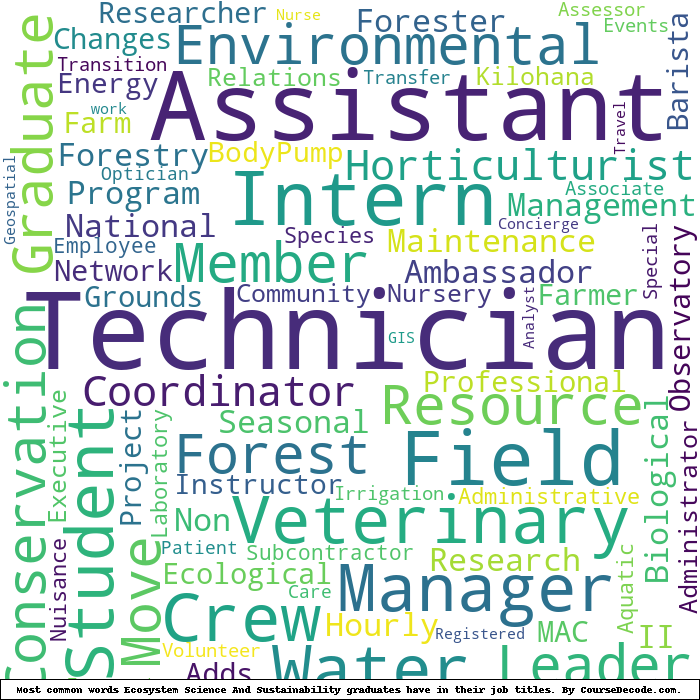
First, some facts. Of the Ecosystem Science And Sustainability graduates from Colorado State University we've analyzed , here's how many have used (or NOT used) their degree in their career:

These are estimates based on AI analysis of 11 LinkedIn profiles (see below).
The verdict? Above average. Overall, with an average relevance score of 73%, Ecosystem Science And Sustainability graduates from Colorado State University have a higher likelihood (+6%) of finding work in this field compared to the average graduate across all fields:
And for comparison, here's the chart for all profiles we've looked at across all degrees.
Also, after graduating, only 27% of these graduates have pursued further education other than another Bachelor's degree (such as a Masters degree or other), compared to the average across all profiles of 35%. This suggests a Bachelors degree is enough for most Ecosystem Science And Sustainability graduates, and it's normal to look for work straight after graduation.
See the details:
|
Relevance score: 69% We think this person has gone into a career only somewhat relevant to their degree. We think this person has gone into a career only somewhat relevant to their degree.
DEGREE INFOGraduated in 2019 from Colorado State University with a Bachelor of Science - BS in Ecosystem Science And Sustainability. No other secondary education since. JOB HISTORY SINCE GRADUATIONAssistant Horticulturist Chicago Botanic Garden May 2019 - Sep 2020 Horticulturist  Greenwise Organic Lawn Care and Landscape Design Sep 2020 - Aug 2021 Executive Administrative Assistant  Marriott's Waikoloa Ocean Club Sep 2021 - May 2022 Kilohana Nursery Assistant  The Kohala Center May 2022 - Oct 2022 Community and Resource Relations Administrator  The Kohala Center Oct 2022 - Present ABOUTAloha! My name is [NAME REMOVED] and I am a leader from the Big Island of Hawai`i, I am actively working towards my Salesforce Administrator Certification while managing The Kohala Centers Salesforce database. I have been in the Horticulture and Sustainability industry for over 8 years! I really enjoy helping others succeed in their goals and providing logistical assistance. I am always happy to help get projects off the ground and follow them through to completion. I strive for effectiveness and efficiency, and love to make it fun while I am at it! I am also a 2x All-American wrestler from Colorado State University - placing in the top 3 in the nation. I am passionate about the sport of wrestling, as well as to coaching up and coming wrestlers. In my free time hiking, camping, gardening, board games, crafts, and spending time with my family. |
The top 10 most common jobs done by the graduates we've analyzed (ranked most common to least) are:
Students who graduated with a degree in Ecosystem Science and Sustainability from Colorado State University have mostly landed jobs that closely tie back to their studies. A lot of them work in roles like Forestry Technicians, Resource Management Crew Members, and various positions related to conservation and environmental management. These jobs generally require a solid understanding of ecosystem principles, and many individuals have found themselves working in settings like botanical gardens, natural heritage programs, and with conservation corps, which all directly benefit from the skills they gained throughout their degree programs.
However, there’s also a fair number of graduates who ended up in jobs that don’t really connect to ecosystem science or sustainability at all. Positions like Travel Concierge, Barista, and Administrative Assistant tend to sidestep the core concepts of their field. This shows that while many graduates are successfully applying their knowledge in relevant roles, there are definitely some who are veering off the path into more unrelated job territories. Overall, it seems like there’s a mix—lots of relevant roles being held, but also a noticeable chunk of graduates taking on jobs that could easily be done by anyone without a specialized background in ecoscience.
Here is a visual representation of the most common words in job titles for Ecosystem Science And Sustainability graduates (this is across all Ecosystem Science And Sustainability graduates we've analyzed, not just those who went to Colorado State University):

From the looks of it, graduates from Colorado State University with a degree in Ecosystem Science and Sustainability have been carving out some pretty interesting career paths. Right after graduation, many of them land positions that are either directly related to the environment, like being a forestry technician or horticulturist, or are involved in roles within related fields, such as conservation and resource management. For instance, there are quite a few people working as field technicians or resource management crew members, which definitely aligns with their studies. This suggests that early on, graduates are mostly securing jobs that reflect their education and passion for the environment.
Fast forward about five years, and many of these alumni are still in eco-oriented jobs but often in more advanced positions. Some start branching out into related roles, such as research assistants or environmental technicians, which shows a willingness to expand their skill sets while staying connected to the core areas of sustainability and ecosystem science. However, there are also a handful of graduates who seem to have veered off the path a bit, taking on roles that are less relevant to their degree, like working as travel concierges or in administrative positions at hotels. Overall, it's a mixed bag, but there are definitely favorable trends for those staying true to their environmental roots, suggesting that the field has opportunities to offer for those passionate about it!
Getting a Bachelor’s degree in Ecosystem Science and Sustainability, especially at a solid school like Colorado State University, can be a bit challenging but definitely manageable if you're passionate about the subject. You’ll dive into a mix of science classes—like biology, chemistry, and ecology—alongside more hands-on courses where you might work outdoors or in labs. It’s designed to get you thinking critically about environmental issues, which can be tricky but also really rewarding. Some might find it tougher than a general liberal arts degree because you’re dealing with complex scientific concepts, but if you enjoy nature and problem-solving, it could feel more like an adventure than a slog. Plus, the support and resources at CSU can really help you out along the way!
Most commonly, in the LinkedIn profiles we've looked at, it takes people 4 years to finish a Bachelor degree in Ecosystem Science And Sustainability.
Looking at the job paths of these CSU grads, it seems like they’re still climbing up the income ladder but might not be making the big bucks right away. Many of their roles are in entry-level, seasonal, or technician positions, which typically don’t pay a ton. For instance, forestry roles and technician jobs often start off on the lower end of the pay scale. Some have moved into more specialized or supervisory roles over time, like the environmental professional and registered veterinary technician positions, which could potentially lead to better pay. However, unless they move up really quickly or land something more lucrative, their early years out of college might feel a bit tight financially. So, while there's potential for better earnings down the line, it looks like they’re still working their way up for now.
Here is a visual representation of the most common words seen in the "about" section of LinkedIn profiles who have a Bachelor degree in Ecosystem Science And Sustainability (this is across all Ecosystem Science And Sustainability graduates we've analyzed, not just those who went to Colorado State University). This may or may not be useful:

Here are all colleges offering a Bachelor degree in Ecosystem Science And Sustainability (ordered by the average relevance score of their Ecosystem Science And Sustainability graduates, best to worst) where we have analyzed at least 10 of their graduates:
| College | Score | Count |
|---|---|---|
 Colorado State University Colorado State University
|
73 | 11 |